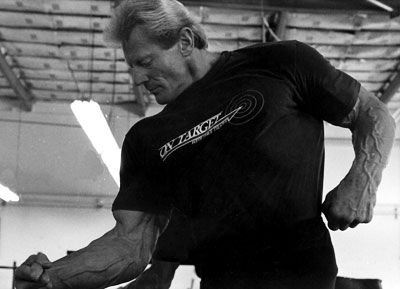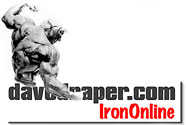Training for the Over-40 Gang, Part One

Download the full Draper here newsletter
in printable, live-link, pdf format, here.
[About 10 years ago a woman was writing a book on bodybuilding for the over-40 gang and asked for Dave’s input. As far as I know, the book was never published, so let’s repurpose this interview for your enjoyment. ~ Laree]
Yes, bombers, somehow the secret got out: I’m over 40. But that doesn’t mean I’ve had it, I’m over the hill, all washed up, finished, kaput or a mere silver sliver of the Blond Bomber I once was. With the aid of a cane and an assistant, I’m able to get about the gym for a hefty workout. I love those big rubber balls.
Anyhoo... here’s a review of the most frequently asked questions collected by a book author, Mui, and the dazzling answers contributed by this dashing young writer, Moi.
Let ’er rip...
Q. As a man over 40, have I lost the ability to grow? I continue to train, but the “packing it on” stage seems to have left me. I lift about the same weight. In fact, a bit more, but the size doesn’t seem to come.
A. Two truths should be revisited and underscored at this point: that’s life and everyone is different. A third truth can be added: 40 to 50 are still very good growth years.
“That’s life” tells us we do slow down in muscular growth as we age. Yet if the basic training precepts are followed -- workout consistency, hard training, smart eating and plenty of rest and relaxation -- muscular size and quality can be improved perceptibly into our 60s.
That “everyone is different” part -- genetics, health, training acumen, drive, toughness and such -- tells us some will flourish more than others. Some will flounder.
Sufficient exercise will keep us in shape. Swell. Those who are suited to progress as they age need to be aggressive with their training, while at once retaining commonsense, care and attentiveness to overtraining and system abuse.
Finesse, passion and creativity are three major qualities that determine and assure a trainee’s continued distinct advancement. They separate the ordinary from the special.
Certain muscles that have not been overtrained or training-saturated -- rear delts, forearms, lower lats, thighs -- can surprise us and respond especially well to specific exercises, and restore our confidence and delight in training and growing.
Finally, the over-40 lifter must be careful not to be dominated or intimidated by the over-40 rhetoric. It’s specious, spurious and insidious with tentacles reaching the subconscious that will defeat a person before age 41.
Q. I am 49 and have just started bodybuilding. My biggest question is what will my skin look like once I am built? Like most my age, my skin is starting to sag. Will building help tighten it or will it just sag over my muscles?
A. The same two truths mentioned above need to be reviewed.
The skin generally will benefit from the physical stimulation and the circulation of life-giving blood offering nutrients and oxygen to its tissues. Furthermore, system detoxification and its positive effect on the body accompany hearty weight-bearing exercise. The skin is not the least of the benefactors to this welcome gain. Health is improving before your eyes.
Added muscle from your bodybuilding can be expected to swell within the skin and improve age-related looseness. On the other hand, the loss of excess fat might counter the skin-tightening effect of the muscle. Don’t despair.
Remember this: If skin tone and wrinkles are the primary interests in your bodybuilding quest, you might be disappointed and miss the grander acquirements of the lifting experience. Given time in training, most everything improves. More often than not, most of the improvements are not what you anticipated or sought: inner character strength, systemic health, bone density, fortified immune system, balanced hormonal activity, improved blood fats and sugars, and a general glow and structural rightness you’re too close to see... and more are on the list.
Q. How long does it take to start losing the muscle you gained, such as when off for sickness or unable to get to the gym to train?
A. This depends on the quantity and quality and maturity of the muscle you carry on your frame, and on your genetic background. Those fortunate trainees who are predisposed to natural muscle development will lose muscle slowly. Sound muscle mass is basic to their structure. Those, like most of us, who train hard for every quivering tissue lose muscle more readily.
Stay strong. Do not fret.
Lifters having dedicated several years to serious muscle building often experience minor muscle loss in the first two to four weeks of forced layoff. The tissues lose their general fullness and fitness from lack of use and stimulation -- a cause of undue depression -- but regain vitality within several intelligent workouts.
Unscheduled layoffs should be and often can be avoided. Make every effort to assure training consistency, even if partial workouts or fewer workouts per week substitute your full training regimen.
One missed workout leads to another and another and you fall into a training gap that’s hard to recall. Smart training sessions modified to accommodate special circumstances, minor illness or injury work wonders to carry you along the crooked way.
Be creative. Be steady.
Keep your training fresh and interesting, but don’t change it too often. Never give in, never give up.
dd
[This is the end of Part One. Here's Part Two.]
*****
Take a trip over to our
Musclebuilding Q&A Blog
... where Dave allows us a peek into his email outbox.
Did you sign up for Dave's expanded email yet?
It's free, motivating and priceless!
We'll also send you a link to Dave's free
Body Revival Tips and Hints e-report with your confirmation notice.

